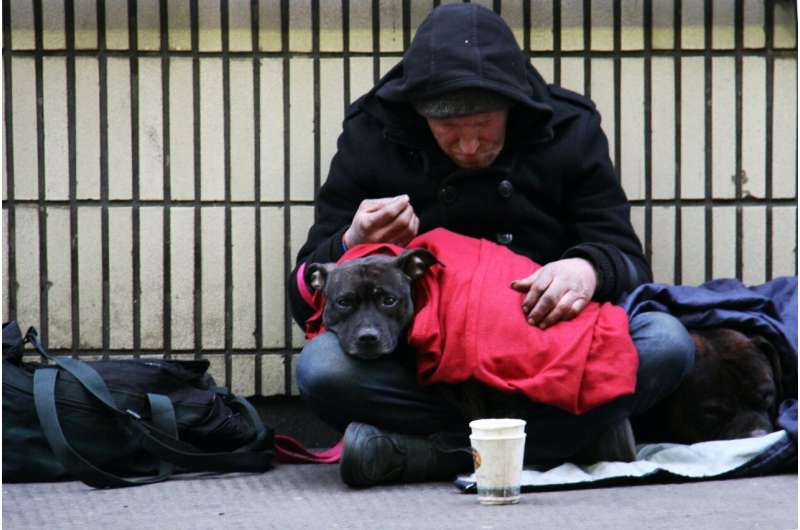Hospitality sector customer perceptions improve when commercial organizations are seen to be employing the houseless
Many hospitality organizations see the benefits of engaging in corporate social responsibility (CSR), which can take many forms. Researchers at Surrey aimed to investigate the impact of hiring individuals experiencing houselessness on customers’ behavioral intentions, attitudes toward an organization, and perceptions of CSR actions.
‘Houseless’ is a term often used in place of homeless—to distinguish between a house and a home. People described as ‘houseless’ may not have physical structures to live in but do feel that they have a ‘home’. ‘Homeless’ individuals may not have a ‘home’ or physical structure to live in.
Across two experiments, researchers from Surrey investigated the impact of employing individuals experiencing houselessness on customers’ perceptions of the employee and organization, using organizational legitimacy theory—a theory that proposes that an organization’s structure is driven by rationalized institutional rules or ‘institutional myths’.
Researchers found that employees known to be houseless prompted more positive perceptions from the customers, resulting in positive feelings towards the company and their responsible actions. In addition to this, the gender of the employees or the quality of the organization did not impact these findings.
Dr. Tracy Xu, Senior Lecturer in Hospitality at the University of Surrey said, “Organizations that create hiring programs and policies targeted at populations who do not have a permanent residence not only help the people they hire, they simultaneously improve customer perceptions through this kind of socially responsible action. Organizations should also consider using available resources or tax benefits to make a deliberate effort to employ those experiencing houselessness. It is a potential win-win for all involved.”
According to Crisis, by the end of 2021, 227,000 households in the UK were experiencing forms of houselessness. There is also a national houselessness crisis in the U.S., and organizations are in prime positions to respond.
In their most recent study, the US Department of Housing and Urban Development (2022) reported that on a single night, approximately 580,000 people were experiencing houselessness across the U.S.. A lack of employment and high costs of living suggest the houseless crisis is not an issue of providing housing, but rather an issue of providing beneficial employment to those who need it.
The study has been published in the International Journal of Contemporary Hospitality Management.
More information:
Nicholas A. Smith et al, Employing the houseless as corporate social responsibility, International Journal of Contemporary Hospitality Management (2023). DOI: 10.1108/IJCHM-05-2022-0649
Citation:
Hospitality sector customer perceptions improve when commercial organizations are seen to be employing the houseless (2023, January 31)
retrieved 31 January 2023
from https://phys.org/news/2023-01-hospitality-sector-customer-perceptions-commercial.html
This document is subject to copyright. Apart from any fair dealing for the purpose of private study or research, no
part may be reproduced without the written permission. The content is provided for information purposes only.

Many hospitality organizations see the benefits of engaging in corporate social responsibility (CSR), which can take many forms. Researchers at Surrey aimed to investigate the impact of hiring individuals experiencing houselessness on customers’ behavioral intentions, attitudes toward an organization, and perceptions of CSR actions.
‘Houseless’ is a term often used in place of homeless—to distinguish between a house and a home. People described as ‘houseless’ may not have physical structures to live in but do feel that they have a ‘home’. ‘Homeless’ individuals may not have a ‘home’ or physical structure to live in.
Across two experiments, researchers from Surrey investigated the impact of employing individuals experiencing houselessness on customers’ perceptions of the employee and organization, using organizational legitimacy theory—a theory that proposes that an organization’s structure is driven by rationalized institutional rules or ‘institutional myths’.
Researchers found that employees known to be houseless prompted more positive perceptions from the customers, resulting in positive feelings towards the company and their responsible actions. In addition to this, the gender of the employees or the quality of the organization did not impact these findings.
Dr. Tracy Xu, Senior Lecturer in Hospitality at the University of Surrey said, “Organizations that create hiring programs and policies targeted at populations who do not have a permanent residence not only help the people they hire, they simultaneously improve customer perceptions through this kind of socially responsible action. Organizations should also consider using available resources or tax benefits to make a deliberate effort to employ those experiencing houselessness. It is a potential win-win for all involved.”
According to Crisis, by the end of 2021, 227,000 households in the UK were experiencing forms of houselessness. There is also a national houselessness crisis in the U.S., and organizations are in prime positions to respond.
In their most recent study, the US Department of Housing and Urban Development (2022) reported that on a single night, approximately 580,000 people were experiencing houselessness across the U.S.. A lack of employment and high costs of living suggest the houseless crisis is not an issue of providing housing, but rather an issue of providing beneficial employment to those who need it.
The study has been published in the International Journal of Contemporary Hospitality Management.
More information:
Nicholas A. Smith et al, Employing the houseless as corporate social responsibility, International Journal of Contemporary Hospitality Management (2023). DOI: 10.1108/IJCHM-05-2022-0649
Citation:
Hospitality sector customer perceptions improve when commercial organizations are seen to be employing the houseless (2023, January 31)
retrieved 31 January 2023
from https://phys.org/news/2023-01-hospitality-sector-customer-perceptions-commercial.html
This document is subject to copyright. Apart from any fair dealing for the purpose of private study or research, no
part may be reproduced without the written permission. The content is provided for information purposes only.
